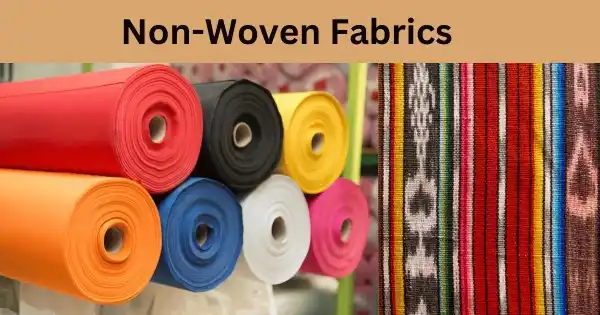Nonwoven fabrics have become popular in the textile production industry due to their versatility and sustainable characteristics. Whether leading an established manufacturing business or starting a new venture, selecting the right machinery for nonwoven fabric textiles is crucial for success. This comprehensive analysis will thoroughly explore nonwoven fabric textile machines and guide you through the selection process to provide the insights needed to make an informed decision.
1. Unlocking the Enigma of Nonwoven Textiles and Their Significance
Before delving into the intricate world of textile machinery, it’s essential to understand the foundational principles governing nonwoven fabrics. In this exploration, we will unveil the essence of nonwoven textiles, discuss their advantages, and highlight the diverse industries that benefit from their unique attributes.
What are Nonwoven Fabrics?
Nonwoven fabrics are a particular type of textile made without the traditional weaving or knitting processes. The manufacturing process involves bonding or interlocking fibers using heat, chemicals, or mechanical methods.
Advantages of Nonwoven Fabrics
Nonwoven fabrics offer many benefits, from cost-effectiveness to environmental friendliness. In the following sections, we will explore these advantages in detail and highlight their significance in today’s textile industry.


Industries Utilizing Nonwoven Fabrics
Nonwoven fabrics are utilized in various sectors, including healthcare, agriculture, and automotive, and we will provide real-world examples of how they are revolutionizing these industries.
2. Evaluating Nonwoven Fabric Textile Machines
Now that we understand the basics of nonwoven fabrics, let’s turn our attention to the heart of our discussion: the machinery used to create these remarkable textiles. This section will explore the key features and essential factors when choosing a nonwoven fabric machine.
Remember these important points:
Critical Features of Nonwoven Fabric Textile Machinery
We will analyze the key features that differentiate one machine from another. These features include production capacity, customization options, and the essential aspect of energy efficiency. It is crucial to understand these features to make informed decisions thoroughly.
Critical Factors in Machine Selection
Selecting the most suitable machine involves more than just looking at its features. Elements such as your budget, production requirements, and available space are equally important. We will guide you through a comprehensive checklist to ensure a sensible selection that aligns seamlessly with your unique needs.
Comparison of Leading Nonwoven Fabric Textile Machine Brands
To simplify your decision-making process, we will provide an overview of some of the top brands in the nonwoven fabric textile machine industry. You can learn about their reputation, product range, and customer reviews.
3. Making the Right Choice
By now, you should understand what to look for when choosing a suitable nonwoven fabric textile machine. This section will provide further guidance to help you make a final decision.
Conclusion
During this article, I delved into nonwoven fabric textile machines. My exploration began by examining the significance of nonwoven fabrics, understanding their production methods, highlighting their benefits, and showcasing their broad utility across various industries. As I progressed, I carefully assessed the essential features and factors to consider when selecting a nonwoven fabric textile machine to ensure you have all the necessary tools to make an informed decision.
With this valuable knowledge, you are ready to move forward in your textile manufacturing venture. Choosing the suitable machine for nonwoven fabric textiles goes beyond practicality; it is a strategic move that can significantly impact your path to success. Whether you want to improve the efficiency of your current operations or start a new textile journey, the machine you choose will be a crucial partner in this endeavor.
Feel free to delve deeper into customer reviews and engage with leading brands in the industry to gather comprehensive information. Remember that the textile sector constantly evolves, and your decisions today will undoubtedly shape your future trajectory. For more information, visit this website and click here.
Frequently Asked Questions (FAQs)
Q1. What are the main benefits of nonwoven fabrics?
Nonwoven fabrics offer numerous advantages, including cost-efficiency, environmental friendliness, and versatility. They are also known for their strength, resistance to moisture, and ability to be customized for specific needs.
Q2. How do nonwoven fabric textile machines work?
Nonwoven fabric textile machines bond or interlock fibers using various heat, chemical processes, or mechanical techniques. This results in a fabric with randomly arranged fibers, giving it unique properties.
Q3. Can nonwoven fabric textiles be used in the fashion industry?
Due to their versatility, nonwoven fabrics are increasingly used in the fashion industry. Designers and manufacturers use them in clothing, accessories, and cutting-edge designs, making them popular in fashion.
Q4. What is the expected lifespan of a nonwoven fabric textile machine?
The lifespan of a nonwoven fabric textile machine depends on factors such as its quality, maintenance, and usage intensity. When properly cared for, high-quality machines can last several years.
Q5. How can I ensure energy efficiency in my nonwoven fabric textile production?
Choose machines with energy-saving features like automatic shutdown, low power consumption, and optimized heating elements to achieve energy efficiency. Regular maintenance and calibration also contribute to energy savings.
Q6. What are the top brands in the nonwoven fabric textile machine industry?
Some of the leading brands in this industry include ABC Textile Machines, XYZ Tech, and Innovate Weaving Solutions. Before making a decision, it’s advisable to research each brand’s product range and customer reviews.

